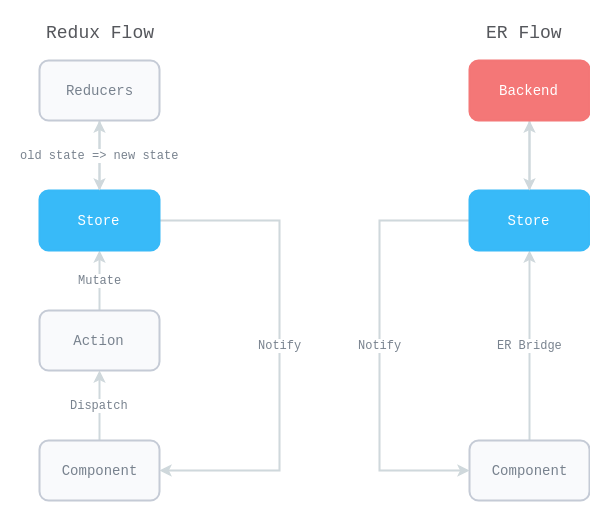ER is a new pattern that provides the opportunity to feel free from actions
This package allows you to get rid of actions. You can use decorators to register actions directly in your state, you don't have to create any actions in your project (until you really need them), as they don't give any profit, only bring extra boilerplate files.
Concepts
Compare these diagrams, we've simplified Redux flow and threw out unnecessary middleware:
📦 Install
To install @ngxs-labs/emitter run the following command:
npm install @ngxs-labs/emitter
# or if you use yarn
yarn add @ngxs-labs/emitter🔨 Usage
Import the module into your root application module:
import { NgModule } from '@angular/core';
import { NgxsModule } from '@ngxs/store';
import { NgxsEmitPluginModule } from '@ngxs-labs/emitter';
@NgModule({
imports: [NgxsModule.forRoot(states), NgxsEmitPluginModule.forRoot()]
})
export class AppModule {}Receiver
Receiver is a basic building block. @Receiver() is a function that allows you to decorate static methods in your states for further passing this method to the emitter:
import { State, StateContext } from '@ngxs/store';
import { Receiver } from '@ngxs-labs/emitter';
@State<number>({
name: 'counter',
defaults: 0
})
export class CounterState {
@Receiver()
static increment({ setState, getState }: StateContext<number>) {
setState(getState() + 1);
}
@Receiver()
static decrement({ setState, getState }: StateContext<number>) {
setState(getState() - 1);
}
}Emitter
Emitter is basically a bridge between your component and receivers. @Emitter() is a function that decorates properties defining new getter and gives you an access to the emittable interface:
import { Component } from '@angular/core';
import { Select } from '@ngxs/store';
import { Emitter, Emittable } from '@ngxs-labs/emitter';
import { Observable } from 'rxjs';
import { CounterState } from './counter.state';
@Component({
selector: 'app-counter',
template: `
<ng-container *ngIf="counter$ | async as counter">
<h3>Counter is {{ counter }}</h3>
</ng-container>
<button (click)="increment.emit()">Increment</button>
<button (click)="decrement.emit()">Decrement</button>
`
})
export class CounterComponent {
@Select(CounterState)
counter$: Observable<number>;
// Use in components to emit asynchronously payload
@Emitter(CounterState.increment)
increment: Emittable;
@Emitter(CounterState.decrement)
decrement: Emittable;
}Alternatively you can use EmitterService instead of decorating properties:
import { Component } from '@angular/core';
import { Select } from '@ngxs/store';
import { EmitterService, Emittable } from '@ngxs-labs/emitter';
import { Observable } from 'rxjs';
import { CounterState } from './counter.state';
@Component({
selector: 'app-counter',
template: `
<ng-container *ngIf="counter$ | async as counter">
<h3>Counter is {{ counter }}</h3>
</ng-container>
<button (click)="increment()">Increment</button>
<button (click)="decrement()">Decrement</button>
`
})
export class CounterComponent {
@Select(CounterState)
counter$: Observable<number>;
constructor(private emitter: EmitterService) {}
increment(): void {
this.emitter.action(CounterState.increment).emit();
}
decrement(): void {
this.emitter.action(CounterState.decrement).emit();
}
}Custom types
You can define custom types for debbuging purposes (works with @ngxs/logger-plugin):
import { State, StateContext } from '@ngxs/store';
import { Receiver } from '@ngxs-labs/emitter';
@State<number>({
name: 'counter',
defaults: 0
})
export class CounterState {
@Receiver({ type: '[Counter] Increment value' })
static increment({ setState, getState }: StateContext<number>) {
setState(getState() + 1);
}
@Receiver({ type: '[Counter] Decrement value' })
static decrement({ setState, getState }: StateContext<number>) {
setState(getState() - 1);
}
}Payload type safety
Emittable and EmitterAction are generics which allow you to type the payload, which is void (alias not present) by default.
For example, Emittable is the same as Emittable<void>. Also it's possible to type it like Emittable<number> or Emittable<any> (if you want it to accept all possible values).
import { Component } from '@angular/core';
import { Select } from '@ngxs/store';
import { Emitter, Emittable } from '@ngxs-labs/emitter';
import { Observable } from 'rxjs';
import { CustomCounter, CounterState } from './counter.state';
@Component({
selector: 'app-root',
template: `
{{ counter$ | async | json }}
<button (click)="update()">update</button>
`
})
export class AppComponent {
@Select(CounterState)
counter$: Observable<CustomCounter>;
@Emitter(CounterState.update)
private update: Emittable<CustomCounter>;
update(): void {
this.update.emit({ value: 5 });
}
}import { State, StateContext } from '@ngxs/store';
import { Receiver, EmitterAction } from '@ngxs-labs/emitter';
export interface CustomCounter {
value: number;
}
@State<CustomCounter>({
name: 'counter',
defaults: {
value: 0
}
})
export class CounterState {
@Receiver({ payload: { value: -1 } }) // default value if payload emitted as undefined
static update(
{ setState }: StateContext<CustomCounter>,
{ payload }: EmitterAction<CustomCounter>
) {
setState({ value: payload.value });
}
}Actions
If you still need actions - it is possible to pass an action as an argument into @Receiver() decorator:
import { State, StateContext } from '@ngxs/store';
import { Receiver } from '@ngxs-labs/emitter';
export class Increment {
static readonly type = '[Counter] Increment value';
}
export class Decrement {
static readonly type = '[Counter] Decrement value';
}
@State<number>({
name: 'counter',
defaults: 0
})
export class CounterState {
@Receiver({ action: Increment })
static increment({ setState, getState }: StateContext<number>) {
setState(getState() + 1);
}
@Receiver({ action: Decrement })
static decrement({ setState, getState }: StateContext<number>) {
setState(getState() - 1);
}
}Also it's possible to pass multiple actions:
import { State, StateContext } from '@ngxs/store';
import { Receiver } from '@ngxs-labs/emitter';
export class Increment {
static readonly type = '[Counter] Increment value';
}
export class Decrement {
static readonly type = '[Counter] Decrement value';
}
@State<number>({
name: 'counter',
defaults: 0
})
export class CounterState {
@Receiver({ action: [Increment, Decrement] })
static increment({ setState, getState }: StateContext<number>, action: Increment | Decrement) {
const state = getState();
if (action instanceof Increment) {
setState(state + 1);
} else if (action instanceof Decrement) {
setState(state - 1);
}
}
}Emitting multiple value
It's also possible to emit multiple values, just define your state:
import { State, StateContext } from '@ngxs/store';
import { Receiver } from '@ngxs-labs/emitter';
@State<string[]>({
name: 'animals',
defaults: []
})
export class AnimalsState {
@Receiver()
static addAnimal(
{ setState, getState }: StateContext<string[]>,
{ payload }: EmitterAction<string>
) {
setState([...getState(), payload]);
}
}And use emitMany method from Emittable object:
import { Component } from '@angular/core';
import { Select } from '@ngxs/store';
import { Emitter, Emittable } from '@ngxs-labs/emitter';
import { Observable } from 'rxjs';
import { AnimalsState } from './animals.state';
@Component({
selector: 'app-root',
template: `
<p *ngFor="let animal of animals$ | async">{{ animal }}</p>
<button (click)="addAnimals()">Add animals</button>
`
})
export class AppComponent {
@Select(AnimalsState)
animals$: Observable<string[]>;
@Emitter(AnimalsState.addAnimal)
private addAnimal: Emittable<string>;
addAnimals(): void {
this.addAnimal.emitMany(['panda', 'zebra', 'monkey']);
}
}Dependency injection
Assume you have to make some API request and load some data from your server, it is very easy to use services with static methods, Angular provides an Injector class for getting instances by reference:
import { Injector } from '@angular/core';
import { State, StateContext } from '@ngxs/store';
import { Receiver } from '@ngxs-labs/emitter';
import { tap } from 'rxjs/operators';
interface Todo {
id: number;
title: string;
completed: boolean;
}
@State<Todo[]>({
name: 'todos',
defaults: []
})
export class TodosState {
// ApiService is defined somewhere...
private static api: ApiService;
constructor(injector: Injector) {
TodosState.api = injector.get<ApiService>(ApiService);
}
@Receiver()
static getTodos({ setState }: StateContext<Todo[]>) {
// If `ApiService.prototype.getTodos` returns an `Observable` - just use `tap` operator
return this.api.getTodos().pipe(tap(todos => setState(todos)));
}
// OR
@Receiver()
static getTodos({ setState }: StateContext<Todo[]>) {
// If `ApiService.prototype.getTodos` returns a `Promise` - just use `then`
return this.api.getTodos().then(todos => setState(todos));
}
}If you work with promises - we advice you to use async/await approach, because method marked with async keyword will automatically return a Promise, you will not get confused if you missed return keyword somewhere:
import { Injector } from '@angular/core';
import { State, StateContext } from '@ngxs/store';
import { Receiver } from '@ngxs-labs/emitter';
export type AppInformationStateModel = null | {
version: string;
shouldUseGraphQL: boolean;
};
@State<AppInformationStateModel>({
name: 'information',
defaults: null
})
export class AppInformationState {
private static appService: AppService;
constructor(injector: Injector) {
AppInformationState.appService = injector.get<AppService>(AppService);
}
@Receiver({ type: '[App information] Get app information' })
static async getAppInformation({ setState }: StateContext<AppInformationStateModel>) {
setState(await this.appService.getAppInformation());
}
}Lifecycle
As you may know - actions in NGXS have own lifecycle. We also provide RxJS operators that give you the ability to react to actions at different points in their existence:
-
ofEmittableDispatched: triggers when an emittable target has been dispatched -
ofEmittableSuccessful: triggers when an emittable target has been completed successfully -
ofEmittableCanceled: triggers when an emittable target has been canceled -
ofEmittableErrored: triggers when an emittable target has caused an error to be thrown
Below is just a simple example how to use those operators:
import { State, StateContext } from '@ngxs/store';
import { Receiver } from '@ngxs-labs/emitter';
import { throwError } from 'rxjs';
@State<number>({
name: 'counter',
defaults: 0
})
export class CounterState {
@Receiver()
static increment({ setState, getState }: StateContext<number>) {
setState(getState() + 1);
}
@Receiver()
static decrement({ setState, getState }: StateContext<number>) {
setState(getState() - 1);
}
@Receiver()
static multiplyBy2({ setState, getState }: StateContext<number>) {
setState(getState() * 2);
}
@Receiver()
static throwError() {
return throwError(new Error('Whoops!'));
}
}Import operators in your component and pipe Actions service:
import { Component } from '@angular/core';
import { Actions } from '@ngxs/store';
import {
Emitter,
Emittable,
ofEmittableDispatched,
ofEmittableActionContext
} from '@ngxs-labs/emitter';
import { CounterState } from './counter.state';
@Component({
selector: 'app-root',
template: ``
})
export class AppComponent {
@Emitter(CounterState.increment)
private increment: Emittable;
@Emitter(CounterState.decrement)
private decrement: Emittable;
@Emitter(CounterState.throwError)
private throwError: Emittable;
constructor(actions$: Actions) {
actions$.pipe(ofEmittableDispatched(CounterState.increment)).subscribe(() => {
console.log('CounterState.increment has been intercepted');
});
setInterval(() => {
this.increment.emit();
this.decrement.emit();
this.throwError.emit();
}, 1000);
}
}💡 TDD
It's very easy to write unit tests using ER concept, because we provide our module out of the box that makes all providers and stores available for dependency injection. So you can avoid creating mocked components with properties decorated with @Emitter() decorator, just use the StoreTestBed service to get any emittable object:
import { EmitterService } from '@ngxs-labs/emitter';
import { StoreTestBedModule } from '@ngxs-labs/emitter/testing';
it('should increment state', () => {
@State<number>({
name: 'counter',
defaults: 0
})
class CounterState {
@Receiver()
static increment({ setState, getState }: StateContext<number>) {
setState(getState() + 1);
}
}
TestBed.configureTestingModule({
imports: [StoreTestBedModule.configureTestingModule([CounterState])]
});
const store: Store = TestBed.inject(Store);
const emitter: EmitterService = TestBed.inject(EmitterService);
emitter.action(CounterState.increment).emit();
const counter = store.selectSnapshot<number>(({ counter }) => counter);
expect(counter).toBe(1);
});Interaction
You can easily provide an interaction between different states using ER. Imagine such simple state that stores information if success and error messages exist:
type AppStatusStateModel = {
successMessage: string | null;
errorMessage: string | null;
};
@State({
name: 'appStatusState',
defaults: {
successMessage: null,
errorMessage: null
}
})
export class AppStatusState {
@Receiver({ type: '[AppStatus] Success' })
static success(
{ setState }: StateContext<AppStatusStateModel>,
{ payload }: EmitterAction<string>
) {
setState({
successMessage: payload,
errorMessage: null
});
}
@Receiver({ type: '[AppStatus] Failure' })
static failure(
{ setState }: StateContext<AppStatusStateModel>,
{ payload }: EmitterAction<string>
) {
setState({
successMessage: null,
errorMessage: payload
});
}
}You want to emit events from another state that makes requests:
@State({ name: 'appState' })
class AppState {
private static tagService: TagService;
@Emitter(AppStatusState.success)
private static success: Emittable<string>;
@Emitter(AppStatusState.failure)
private static failure: Emittable<string>;
constructor(injector: Injector) {
AppState.tagService = injector.get<TagService>(TagService);
}
@Receiver({ type: '[AppState] Add tag to the DB' })
static addTag(_, { payload }: EmitterAction<string>) {
return this.tagService.addOne(payload).pipe(
tap(response => this.success.emit(response.message)),
catchError(error => {
this.failure.emit(error.message);
return of(error);
})
);
}
}


